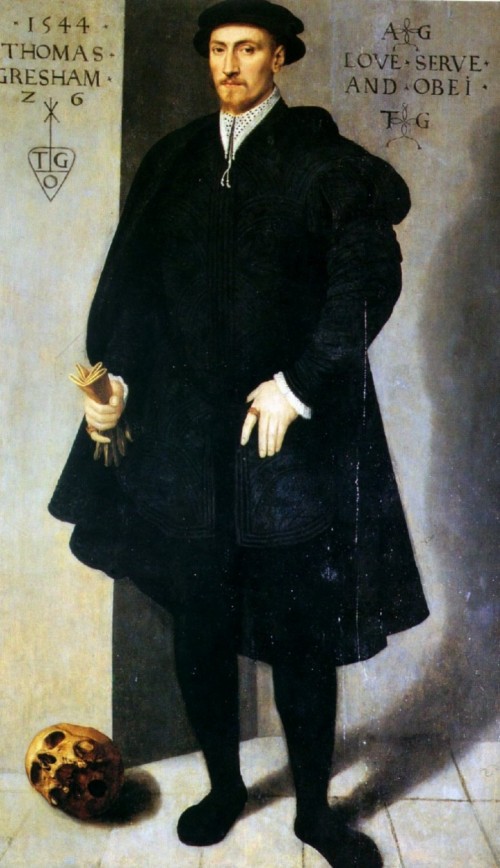World’s first media critic…..
Sir Thomas Gresham was an English merchant who worked for both King Edward VI and Queen Elizabeth I (1519-1579)
Gresham was also the world’s first media critic, although he didn’t know it at the time.
Gresham is best known today among Economics 101 students for what is commonly called ‘Gresham’s Law’. (Although Gresham never formally wrote anything out), as a merchant he quickly came to understand that ‘bad money drives out good’ which is the basis of ‘Gresham’s law.
What that means (as a grad in good standing of Econ 101, is that in any system that has two currencies, the debased (or more worthless)) currency will drive out the more valuable currency. People prefer to keep the currency they perceive as more valuable and hence will more quickly trade the currency they view as worth less, relatively.
The most recent example of this, at least when it comes to money, is our own dollar.
Until 1934, a US dollar was worth 1.5048 grams of gold, and could freely be exchanged for that at any time. Pretty remarkable when you think about it. Dollars and gold and gold coins were freely exchanged and really interchangeable. When they said ‘sound as a dollar’, it meant something. (The UK Pound, interestingly, is called a pound because 1£ once was equally exchangeable for a pound of silver. That’s why it was called Pound Sterling.. and still is).
In any event, in 1934, Franklin Roosevelt, by executive order declared that the dollar henceforth would be redeemable for .850 grams of gold, effectively debasing the dollar in half (or almost so) immediately. The reaction? Gold disapperaed from common exchange almost immediately. People naturally began to horde gold and trade more paper dollars. This created an independent market for the value of gold, and by 1971, one dollar was worth, effectively 1/35th of an ounce of gold. In 1971, Nixon disconnected the dollar from exchangeability at all, and henceforth the dollar was backed only by ‘faith in the US Government’. Gold itself was traded entirely independently from paper money. When was the last time you bought something for a piece of gold? Or a gold coin?
Now, all this is very interesting, but what does this have to do with media?
A lot, really.
Our currency, so to speak today, is information. More than coins, if you think about it.
With the rise of the Interent, we have entered a world of “two currencies”, just like Gresham’s world. I have printed newspapers but I also have online newspapers. Two currencies, representing exactly the same thing.
In our own “Gresham’s Law”, the more dynamic currency drives out the less dynamic one. Hence, people are more likely to ‘trade’ online news than paper news. It’s more easily acquired and it’s more flexible – it is more responsive, it changes faster. This does not mean it is ‘better’. In some ways, it is debased… perceived as cheaper, hence more rapidly traded. One is more likely to post an online article than clip and mail the very same article from the NY Times. There is a difference. And in this difference, the more dynamic media drive out the less dynamic.
When all media on the web are compared, the same rule holds true – The more dynamic drives out the less dynamic.
Take two real estate web sites: One has video, the other is only text, yet they are selling the very same house. Which garners more success? Two dating sites: One is text only, the other has video. Which garners more dates?
Now take two news sites. News is in many ways a commodity. One news site has video, the other text and photos. Which garners more hits. Which is more ‘popular’, hence higher ad rates, hence it survives?
In England, Henry VIII and his son, Edward had progressively debased English coins by decreasing the silver content and adding brass. England was deeply in debt. Gresham urged Elizabeth to restore the value of the English money by pouring gold back into the coins, making them more attractive to traders. This she did, at great cost, but in doing so, restored the solvency of the English economy and wiped out the debt.
Gresham’s discovery was not really all that new. Aristophanes made the point in The Frogs in 405 BC.
The course our city runs is the same towards men and money.
She has true and worthy sons.
She has fine new gold and ancient silver,
coins untouched with alloys, gold or silver,
each well minted, tested each and ringing clear.
Yet we never use them!
Others pass from hand to hand,
sorry brass just struck last week and branded with a wretched brand.
So with men we know for upright, blameless lives and noble names.
These we spurn for men of brass….

